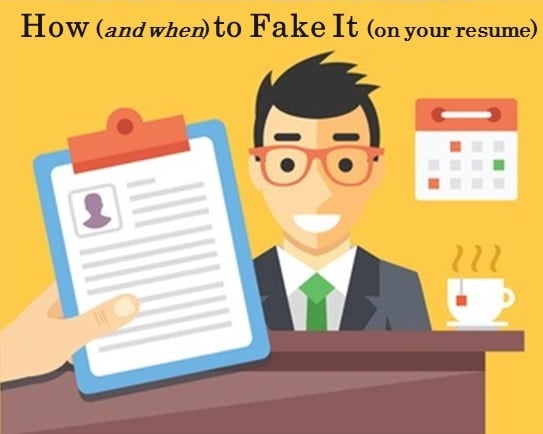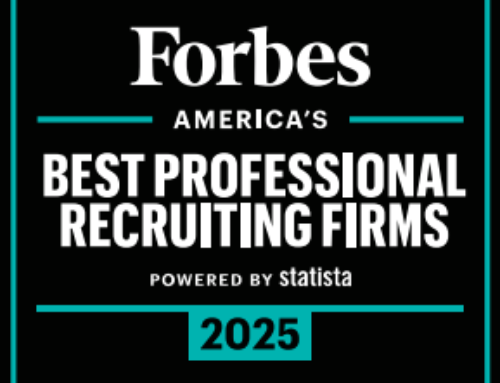 So you’ve decided it’s time to look for a new job. However, your resume doesn’t make you look like a great candidate on paper. In fact, it’s a bit lackluster overall. You think to yourself, “if only I changed a few things I would look like an all-star candidate that every company would want to interview.”
So you’ve decided it’s time to look for a new job. However, your resume doesn’t make you look like a great candidate on paper. In fact, it’s a bit lackluster overall. You think to yourself, “if only I changed a few things I would look like an all-star candidate that every company would want to interview.”
Now most people will tell you never to lie on your resume and I am not saying you should ever lie…but what about reframing your story to beef up the resume?
Here are 4 things you can get away with faking on your resume… and 4 things that you can’t.
4 things you can change on your resume:
1. Job Title – You want your title to reflect what you have done for a company and be verifiable during a background/reference check, but you also don’t want a job title to hinder you from getting an interview for another job. If you want to further elaborate on your role, it’s okay to add and adjust with a backslash, hyphen, or parentheses. For example if your title is “Account Executive” or “Sales” you can make it more specific and relevant to highlight key points of experience that would be more relevant to the role you are applying for.
ABC Company, June 2012 – September 2016
Account Executive/Enterprise Software Sales/SaaS
ABC Company, established in 2011, is a leading provider of Database and Educational Software to both commercial enterprises and educational institutes across the US.
All of these are acceptable and if you are pursuing a role in a specific field they will help potential employees see the translatable skills on paper. It is also helpful to include a brief description of what it is your company does which will also help to highlight what you’ve done.
- Job Responsibilities – It is not necessary to copy the job requirements of what you did into your resume, but instead focus on the areas that will highlight not only what you’ve done, but also what you can bring to a potential employer. Sales Managers like to see activity focused resumes. Instead of saying “made calls to potential clients in the database space” be specific – “made 70-100 calls and emails/day to C-level decision makers (CIT, CTO and CRO) in the database space” holds more value.
If you are looking to transition into sales from another field, try to leverage similar skills. For example if you are an Analyst, perhaps you are working on 3-5 client focused projects/week or in Customer Service, maybe you handle 100 inbound calls a day. Focus on the job responsibilities that will be relevant to your next employer.
{Related Article: 5 Reasons Your Resume is Actually Hurting Your Job Search}
- Career History – The last thing you want to fake on your resume are the dates of employment. If you have long gaps or inconsistent work, here is how you could handle it. If you worked several contract roles, temp roles or 1099 roles, you can group them together under one heading and add the various positions below. For example:
Business Development Consultant – September 2014 – September 2016
XYZ Inc., Business Development (6 Month Contract)
ACME Brothers, Lead Generation (6 Month Contract)
Corporate Company, Sales Development Associate (6 Month Contract)
And of course, you do not have to list every job you have ever had on your resume. Make sure to include and expand on roles that are relevant to your search. Highlighting the wins and achievements at a Marketing Internship while in college may be more relevant than your part-time gig as a grocery store cashier while in school.
Bonus Tip: Do you have a GPA above a 3.3? Did you fully finance your education by working full-time? Were you a collegiate athlete? Or involved in volunteering/clubs? These are things employers love to see on a resume, so make sure to highlight these extracurricular involvements!
{Looking for a new sales job? Get in touch with Treeline here}
- Required Skills – So you took an excel course in college and you’re applying for a role that requires specific excel experience, should you list it? If you have some exposure to a program like Excel, and could spend an afternoon brushing up and re-teaching yourself, it’s worthwhile to do so. However, if the requirements include having SQL experience and you’ve never heard of it, you can’t put it on your resume. Alternatively, you could use something that is similar. For example many companies require candidates to have Salesforce.com experience, but if you’ve used a similar CRM platform, make sure to list those on your resume.
Now for the important part – 4 things you should never change on your resume.
- Dates of Employment – This is a huge red flag and one that is easily verifiable with a quick call into HR. If you have a 3-month gap in between jobs, the last thing you want to do is pad the dates on either end. It may seem tempting to eliminate gaps, but hiring managers will notice this. However, if you worked in your role as a temp-to-perm for 3 months before being hired on as a full-time employee than you can include that in your time. Another red flag is seeing a resume with years but no months. If someone worked from 2015 – 2016, the first thing I want to know is when you started and when you finished.
- Education – I often see candidates list a college they attended without a degree next to it if they did not complete the program. While this is okay to do, if you put that you received a BA or BS when you did not, you’re at risk of losing the offer or the job, regardless of how long you have been with the company.
- Awards – I have seen candidates put that they were #1 rep in the company, Rookie of the Year, President’s Club Winner, etc. This is great since your resume is where you want to brag and list achievements. However, if you did not receive those actual awards or they are not listed on your LinkedIn profile (which should mirror your resume), then there is a good chance the hiring manager will find out. I know many VP of Sales that would rather hear “I finished at 85% of quota and was #2 on the team,” then “I killed it,” with no evidence.
{Related Article: 7 Easy Tips to Build a More Effective Resume and Cover Letter}
- Fake Companies – While this should go without saying, it is never a good idea to invent a job or role to fill your resume. Some candidates think that if their previous company went out of business, they can fabricate dates of employment or titles, but chances are former colleagues and managers are still around and could be connected. This will only hurt you in the long run.
So there you have it, what you can and simply cannot get away with when it comes to making changes or embellishments on your resume. Always be prepared to tell your story when discussing your background with the hiring manager. The resume gets your foot in the door, but you still have to sell yourself in the interview.
Ace the interview and get the job. Watch the video below on How to Prepare for a Sales Interview.
Share This Story, Choose Your Platform!
What our happy clients are saying
Contact Us for a Free Consultation
Tell us more about your business and how we can help.











